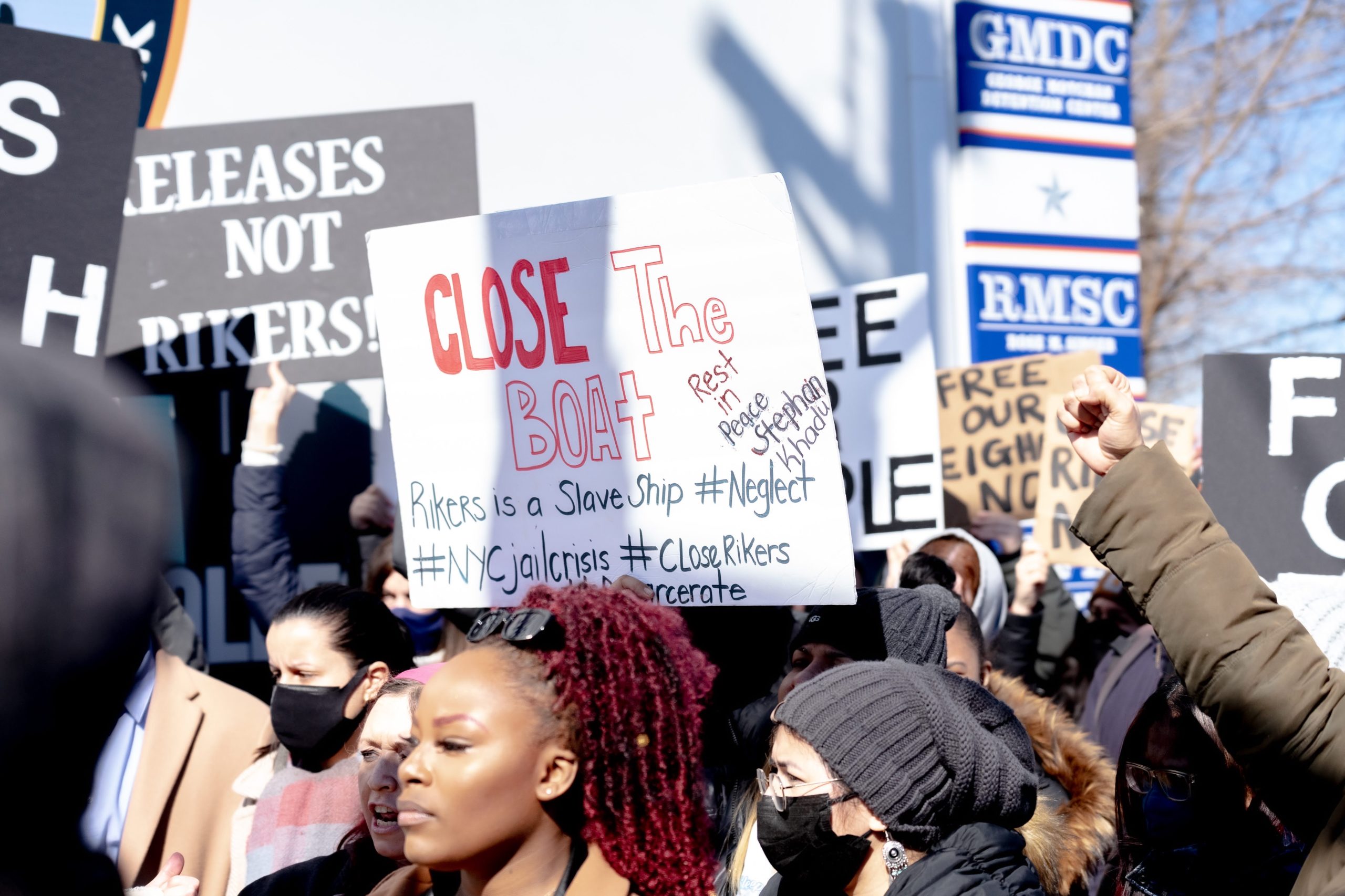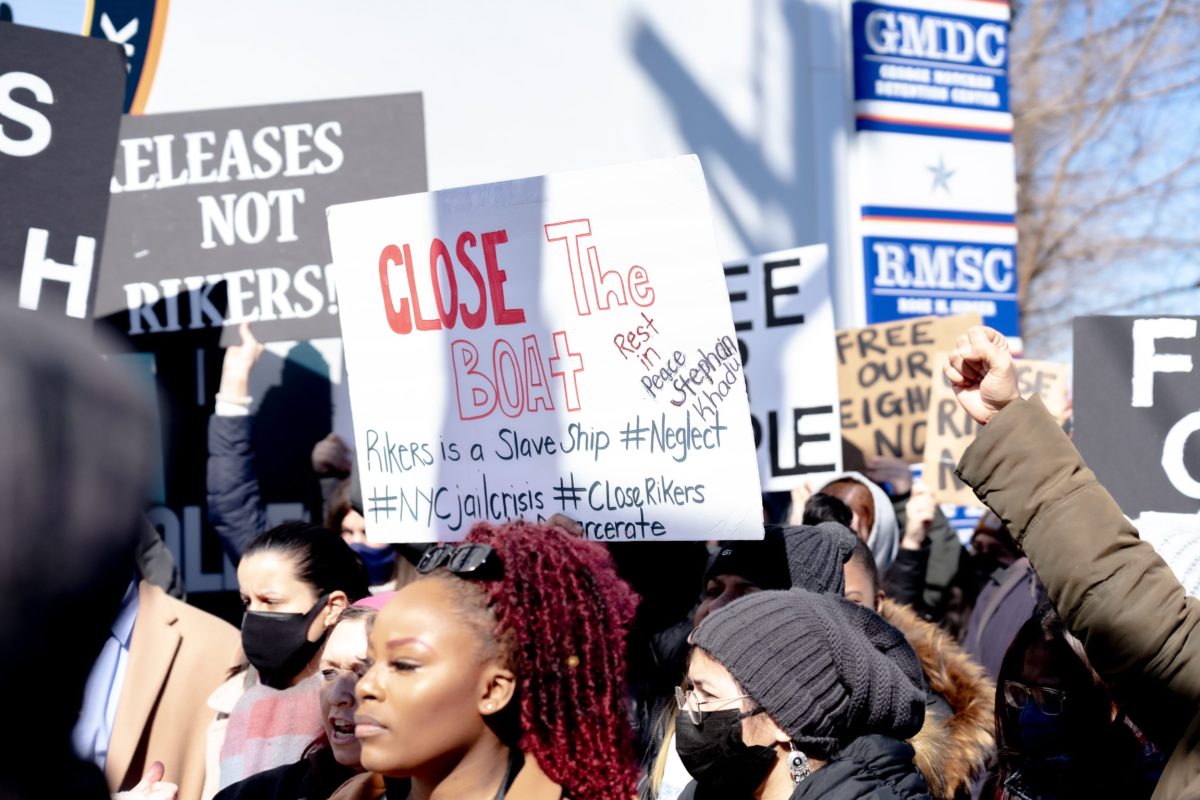Newsletter
“The Media Emboldens a Police State”: A conversation with movement lawyer Olayemi Olurin
Olayemi Olurin spoke with The Appeal about abolition, living in a police state, Rikers Island, and the media.


“The Media Emboldens a Police State”: A conversation with movement lawyer Olayemi Olurin
Elizabeth Weill-Greenberg and Olayemi Olurin
Inside New York City courtrooms, movement lawyer and commentator, Olayemi Olurin battles a legal system set up to punish, humiliate, and degrade her clients, all of whom are poor and many of whom are Black.
Olurin spoke with The Appeal about abolition, living in a police state, and the media, which she says plays an “indispensable role in upholding our criminal system.”
She also told us what inspires her to keep fighting.
This interview has been edited for length and clarity.
Q: What is prison abolition?
A: Abolition is a vision of tomorrow.
We have a massive prison industrial complex that doesn’t do anything to make us safer. Instead of putting all this money into prisons and police and incarcerating the same communities repeatedly, we want to start divesting from prisons. Putting that money back into the communities, back into the infrastructure, health, housing, education, and everything that would alleviate the actual root causes of crime so that we could stop crime itself.
Q: In this country, it’s so hard for people to imagine a world without prison cells, jails, or police. People say, ‘Well, what would we do about violent crime? What would we do about theft?’ How do you respond?
A: We would actually address it. The system that we have in place does not address those things at all. Condemning violent crime does not stop violent crime from reoccurring. If we actually want violence to stop happening, we have to actually interrogate what’s causing the violence.
I think it’s important to remember that over 80 percent of the cases we have in our criminal system nationwide are misdemeanor or nonviolent offenses. They have nothing to do with violence.
Violent crime is not only rare, but it’s also deeply interpersonal so it requires an interrogation of how we got there. So that’s my response. Let’s actually address it.
Q: Can you talk about the lack of respect for people’s time when they are charged with a traffic violation, misdemeanor, or felony, whatever it might be?
There’s no respect in any shape or form. We created an entire virtual court system that works. Post bail reform and our virtual system, our failures to appear in court went down dramatically.
We created this incredibly efficient system and they did not want it so badly. They could not stand the fact that they could not issue warrants on people as often. They insisted, “Let’s get back to court.” Why? It’s literally far more efficient and easier on everybody involved.
Your clients, that are already poor people, have to figure out how to get there. They gotta go find childcare. If they haven’t lost their job, the job has to let them off for an entire day.
It’s just a series of negative consequences. I once had a client [arrested for] a DUI. She had a newborn baby. She never once missed a court date. She had no one to watch that baby. She had the baby in court. And the judge reprimanded her. She was like, “You need to get childcare.”
The judge is aware of everything. You are aware that this person is poor and she has come to court and you are screaming at her in court because her child is there. Who the fuck is paying for childcare? Who’s paying for it? You paying for it?
Q: In April, The Guardian reported that police had killed almost 600 people in traffic stops since 2017. Black drivers make up 28 percent. These statistics don’t include people who are shot, but survived or were otherwise harmed. Can you talk about the danger of having police conduct traffic stops?
A: When you live in a police state, you live in a society that criminalizes everything. People don’t even realize that it’s an abnormal response to everything. There are systems in countries that don’t respond this way. I’m born and raised in the Bahamas, we don’t do this shit.
Oftentimes traffic offenses can be dealt with, without the criminal law. You can give a ticket and that’s white people’s experiences with traffic infractions.
Do you know how many criminal cases I have of traffic shit because they decide they’re going to arrest? Because they can give a ticket, but Black people [they] arrest. There are people who have sat up in Rikers, or lost their lives—you look at the Philando Castile’s, you look at the Daunte Wright’s—because of traffic stops.
Q: What role does the media play in propping up the police narrative?
A: The media emboldens a police state by treating all of what the police say as fact, instead of police being treated as other governmental agents or regular individual people, whose narrative needs to be interrogated.
Q: How do you maintain hope? What inspires you to stay in the fight?
A: There are no new pains. I say this a lot as an Audre Lorde quote. I constantly read from all of the thinkers and people before me that have already explored and dealt with the same issues.
Some people might hear that and think, “Oh it doesn’t get better.” But it does. Even the fact that we’ve gotten to a place that in mainstream coverage, we can even talk about abolition— even if we’re in the minority, even if they’re fighting us constantly—the fact that we can get it to the main stage.
I believe in the permanence of racism. I don’t expect the entire criminal system is going to be abolished in my lifetime. There were people fighting about it before me. There are people fighting for it now, during me. There will be people fighting for it after me.
And so, you know, therapy.
Q: Is there anything else you’d like to discuss that I didn’t ask about?
A: Rikers is a human rights crisis. [New York City Mayor] Eric Adams is more concerned with the Department of Correction than he is with anybody incarcerated at Rikers and he continuously tells us that.
A [federal] receivership would allow the court to appoint a neutral, nonpartisan expert. They’d be allowed to fire people, hire people, change policies as they wanted.
Ultimately Rikers needs to be closed, but what needs to happen to stop these deaths, we need new people in charge of what’s happening at Rikers.
In the news
Reporter Cerise Castle obtained a video that shows deputies with the Los Angeles County Sheriff’s Department attacking Blake Anderson as he walked with a friend. Since the beating, he has lost all vision in his right eye. Anderson is facing charges of assault on an officer. [Cerise Castle / Knock LA]
More than four million people, or one in every 50 adults, will be barred from voting in the 2022 midterms due to a felony conviction, according to a new report from The Sentencing Project. In Florida alone, 1.1 million people are banned from voting—more than any other state in the country—and more than one in 10 Black adults is disenfranchised. [The Sentencing Project]
Nearly 20 states have constitutions with language permitting slavery and involuntary servitude as criminal punishments. Voters in five states are now considering measures that could rein in the use of forced labor by people convicted of certain crimes. [Kimberlee Kruesi / Associated Press]
Nearly 100 in-custody deaths in Maryland will face independent review amid scrutiny of the former chief medical examiner’s role in the George Floyd murder trial. Dr. David Fowler testified that he wouldn’t have classified Floyd’s death as a homicide. [Dylan Segelbaum / The Baltimore Banner]
A recent audit finds that the Philadelphia Police Department—with a nearly $800 million budget—has “lowest-in-class homicide clearance rate, slow 911 response times that are worse in communities of color, and a dearth of community input and trust.” [Anna Orso / The Philadelphia Inquirer]
That’s all for this week. As always, feel free to leave us some feedback, and if you want to invest in the future of The Appeal, please donate here.
